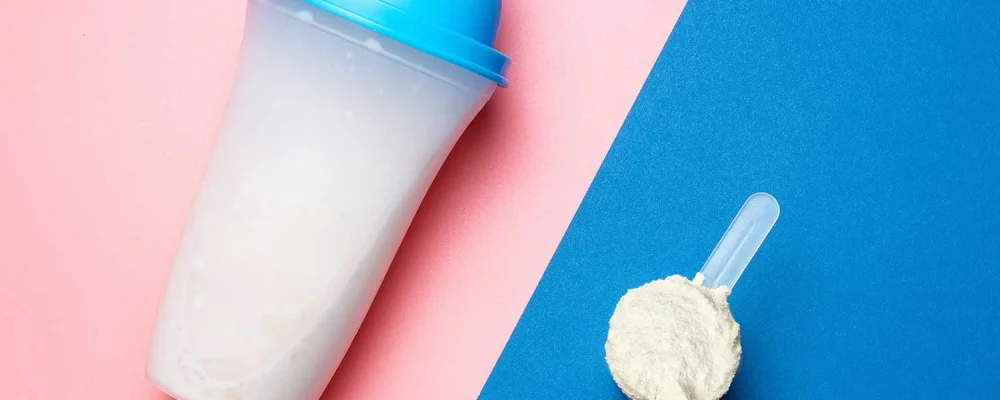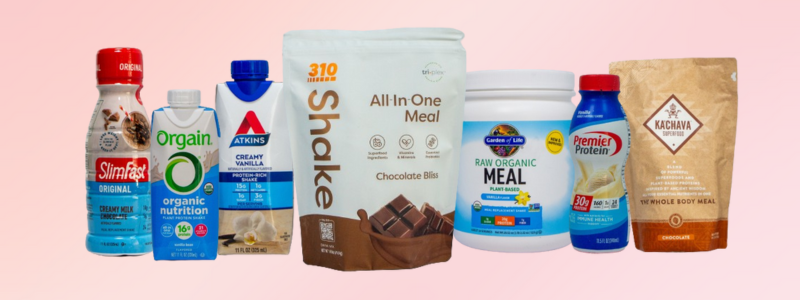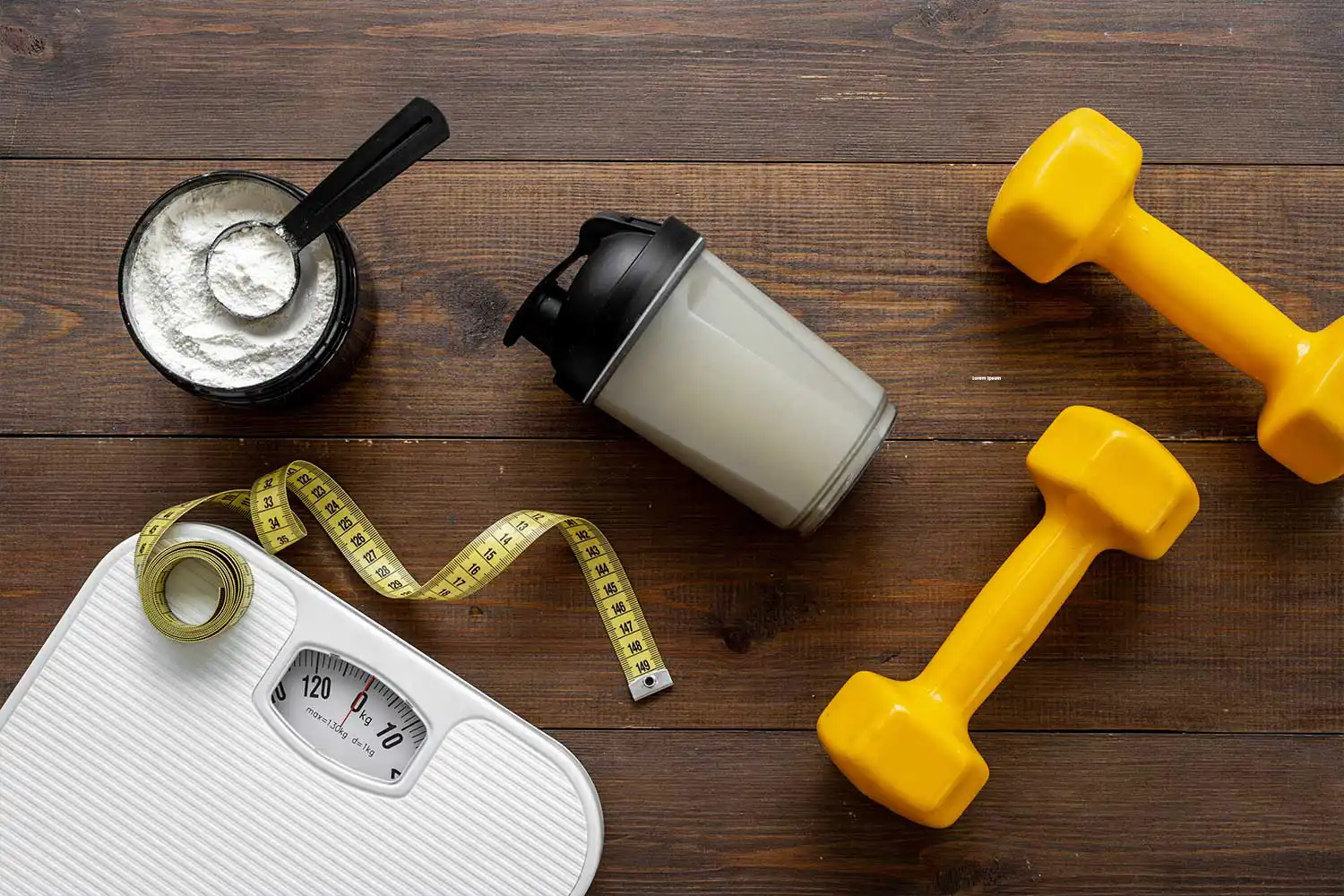We know you’ve been there (because we have to!). You’ve...
Recently, meal replacement and protein shakes have gained popularity, leaving many wondering which option is best. Which will benefit you in achieving a fitness goal among meal replacement shakes vs. protein shakes? The debate between meal replacement shakes and protein shakes is common, and it’s important to understand their differences to make an informed choice. In this post, we will compare meal replacement and protein shakes to help you determine which one aligns better with your goals and desired outcomes.
Overview of Meal Replacement Shakes
Meal replacement shakes are designed to contain the balanced nutrition found in a regular, healthy meal. One might wonder, if meal replacement shakes healthy or not? given their mix of protein, carbs, fats, and vitamins/minerals, they can be a nutritious option.. Some meal replacements include dietary fiber, which is important for a healthy digestive and cardiovascular system. These shakes come in a convenient form, making them perfect for individuals with busy lifestyles who struggle to find time to cook nutritious meals. They can be easily consumed, providing a quick and convenient option for those on-the-go.
Overview of Protein Shakes
In contrast to meal replacement shakes, protein shakes are typically used as a snack or supplement throughout the day, often before or after exercise – in order to boost overall daily protein intake and help with energy and recovery.
Protein shakes can serve as a replacement for a full meal when they are combined with additional ingredients such as oats, nut butters, yogurt, fruits and veggies, and a liquid of choice in a blender to make a smoothie. Unlike meal replacement shakes, protein powders often do not have the varied and balanced nutritional profile necessary to replace a meal on its own, and needs to be combined with other ingredients.
However, they can be useful to help balance your overall diet and consume less animal proteins. You can replace a protein-rich meal like steak or scrambled eggs with a quick shake that includes a protein powder – which will provide your body with essential amino acids
Key Differences Between Meal Replacement Shakes and Protein Shakes
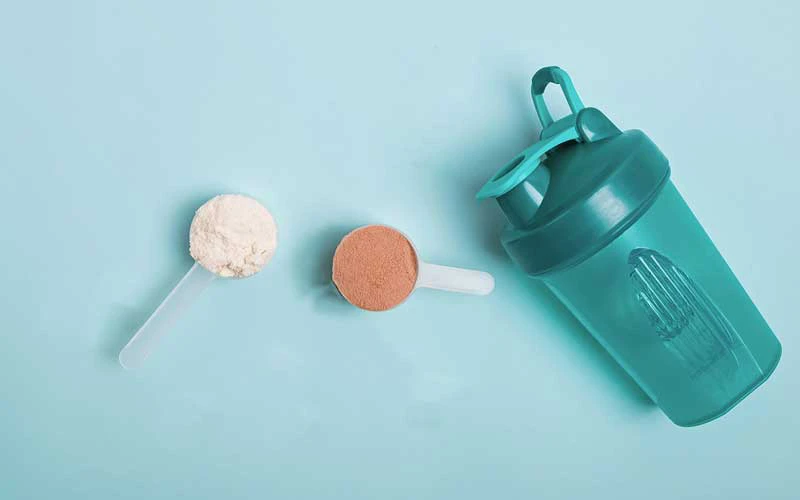
Meal replacement and protein shakes have different nutritional compositions and serve different purposes. While meal replacements are often used to assist with weight loss or maintenance, protein drinks are commonly used for enhancing athletic performance and building muscle.
Nutritional Composition
Meal replacement shakes and protein shakes do have some similarities in terms of nutrition, however. Both shakes are generally low in sugar and cholesterol while providing good protein.
Meal replacement shakes have more carbohydrates, usually ranging from 15 to 40 grams per serving, and they often contain dietary fiber, superfoods, vitamins, minerals, probiotics, and digestive enzymes.
Protein shakes contain less carbs, about 5 to 10 grams per serving, but more protein, ranging from 15 to over 30 grams per serving. While they may have added vitamins and minerals, they typically have fewer additional ingredients than meal replacement shakes.
Both shakes can be helpful for weight management, muscle recovery, and overall nutrition.
Caloric Content and Macronutrient Distribution
The caloric content and macronutrient distribution differ between meal replacement and protein shakes. Meal replacement shakes are generally designed to provide a moderate caloric intake, typically 200 to 600 calories per serving.
These shakes, known for their benefits, offer a well-rounded nutrient composition, with protein accounting for approximately 20-30% of the calories consumed, carbohydrates comprising 40-60%, and fats contributing 20-30%. However, based on dietary regimens like keto, calorie distribution may differ. This composition is intended to support overall nutrition and satiety.
Protein drinks usually contain fewer calories, typically 100 to 200 per serving. They prioritize protein, often providing a higher percentage of calories from protein (up to 70-90%), with a minimal amount of carbohydrates and fats.
Role in Weight Management
Meal replacement and protein shakes can play different roles in weight management strategies. Meal replacement shakes are commonly used as a tool for weight loss or weight maintenance. They provide a nutritionally-balanced alternative to a full meal, which can help with controlling calorie intake while ensuring essential nutrients are still consumed.
Protein, carbohydrates, and fats can make you feel full, which helps prevent overeating. They promote satiety and reduce the likelihood of consuming excessive calories.
Protein drinks, on the other hand, are often used to support muscle maintenance or muscle gain during weight management. The high protein content aids in muscle recovery, synthesis, and retention, which is important for individuals engaging in physical activity or resistance training.
When incorporating either shake into your weight management plan, it’s essential to consider your overall caloric needs, macronutrient distribution, and individual goals.
When to Choose Meal Replacement Shakes?
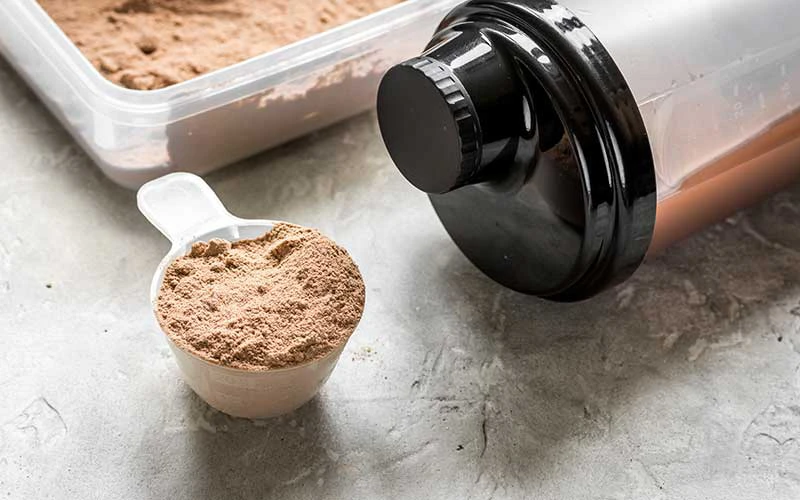
Meal replacement shakes are very popular these days. As mentioned, designed to replace meals and help with weight loss and maintenance. They are especially useful for busy people like business professionals, gym enthusiasts, and those prioritizing their health.
A typical meal replacement shake contains 90 to 200 calories per serving and provides essential nutrients for good health. It can be considered a complete meal in a drink. Protein in these shakes helps control hunger, keeps you feeling full, boosts your metabolism, and preserves muscle mass, especially during a diet.
Generally, meal replacement shakes are low in sugar, carbs, and fat. It’s important to check the label for the presence of vitamins and minerals.
Learn how to choose the right meal replacement shake for your needs, especially if you’re looking to lower your daily calories. Many people choose to replace their breakfast or snacks with meal replacement shakes. These nutritious drinks can save you time and money. You can drink your meal instead of spending time cooking or waiting in line at a fast-food restaurant.
Meal replacement shakes also make it easier to keep track of your daily macros and calories and stick to your diet. They’re convenient and can be consumed in the car, at work, school, the gym, or while moving. For example, if you’re on a long drive or traveling abroad, you can pack a few shake mixes in your luggage.
When to Choose Protein Shakes?
Protein shakes are not made for weight loss but to help build lean muscle. They benefit athletes, outdoor enthusiasts, and gym-goers who need extra protein. Your muscles need protein to grow and recover after exercise, and your body needs it for proper functioning. Insufficient protein intake can lead to muscle loss, weak bones, slow recovery, and a sluggish metabolism.
Protein shakes should not replace meals. Instead, they should supplement your diet and make it easier to meet your protein needs when you’re active. It’s best to consume them before or after exercising.
Whey protein drinks are great for promoting the growth of lean muscle tissue. Casein, a slow-digesting protein, helps optimize the release of amino acids. Combining whey and casein creates an ideal protein supplement that sustains an anabolic environment for muscle growth by providing rapid protein synthesis and slowing down digestion and absorption.
Meal Replacement Shakes Vs. Protein Shakes Key Benefits
Meal replacements and protein drinks have different nutritional compositions and are intended for different purposes. Meal replacements are designed to aid in weight control, while protein drinks are commonly used to enhance athletic performance and promote muscle gain.
Key Benefits of Meal Replacement Shakes
- Meal replacement shakes provide important nutrients in a convenient form.
- Help with weight loss or weight maintenance.
- Meal replacement shakes are protein and fiber-rich, promoting satiety, heart health, and digestion.
- They offer a cost-effective option for a healthy diet.
- Meal replacement shakes can assist in managing blood sugar levels.
- The fiber content in these shakes can help lower cholesterol levels and control blood sugar.
Key Benefits of Protein Shakes
- Promote muscle growth, size, and strength.
- Support weight loss by boosting metabolism, reducing appetite, and increasing feelings of fullness.
- Aid in post-workout recovery by repairing and fueling muscle tissue.
- Improve mood and reduce mental exhaustion after a workout.
- Provide a convenient way to increase protein intake.
Meal Replacement Shakes Vs. Protein Shakes Side Effects
Meal replacement shakes and protein shakes both can cause potential side effects:
| Meal Replacement Shakes Side Effects | Protein Shakes Side Effects |
| Gastrointestinal (GI) side effects: bloating, constipation, diarrhea, gas, stomach pain, inflammation, allergies, digestive disturbances, autoimmune dysfunction from synthetic vitamins | GI side effects: Bloating, constipation, cramps, diarrhea, gas, nausea, and stomach pain |
| Slowed digestion: constipation, gas, leaky gut | Whey protein: Gas, bloating, diarrhea, and stomach cramps, especially for lactose-intolerant people |
| Lack of fiber negatively impacts gut health | Kidney damage: Excessive protein strains kidneys, leading to potential damage |
| Potential weight gain due to high protein, healthy fats, and quality carbohydrates | Blood sugar fluctuations and weight gain: Drinking too many protein mixtures can cause these problems |
| Possibility of other deficiencies in the body | Heart problems: Overconsumption of whey protein can affect heart health, causing arrhythmia, cardiac arrest, and other issues |
| Meal replacement shakes may not be efficient for everyone | Symptoms vary from person to person |
| Potential lack of beneficial phytochemicals | Non-dairy protein powder can help lactose-intolerant individuals |
FAQs
Are protein shakes suitable for meal replacement?
While protein mixtures can help increase protein intake, they aren’t great for complete meal replacement on their own. Protein drinks primarily focus on delivering protein and lack the comprehensive nutritional profile of meal replacement shakes, which contain a balance of macronutrients and micronutrients necessary for a complete meal.
Can meal replacement shakes be used as a post-workout recovery drink?
Yes, meal replacement shakes can aid recovery after a workout. However, specific post-workout protein mixtures deliver a higher protein dose for targeted muscle recovery.
Are meal replacement shakes as effective as a whole meal?
Meal replacement shakes provide a balanced combination of protein, carbohydrates, fiber, and essential nutrients, resembling a complete meal. However, they should not be used as a sole substitute for all daily meals and are meant to be incorporated into a well-rounded diet.
What’s the primary benefit of protein shakes over meal replacement shakes?
The primary advantage of protein shakes lies in their concentrated protein content. They are specifically formulated to meet the increased protein requirements of these individuals.
Can I use meal replacement shakes and protein shakes interchangeably?
While both meal replacement and protein shakes can be a part of a balanced diet, they serve different purposes. Meal replacement shakes are designed to mimic a full meal, providing balanced nutrition. On the other hand, protein shakes are primarily aimed at supplementing protein intake. Thus, their interchangeability depends on your nutritional needs and goals.
Is there a specific time of day that’s best to consume these shakes?
Both meal replacement and protein shakes can be consumed at any time of the day, depending on your dietary needs. Meal replacement shakes are often used when you’re short on time for a proper meal. Protein shakes are commonly consumed post-workout to aid muscle recovery, but can also be taken between meals to increase daily protein intake.
Final Thoughts
In conclusion, it’s important to consider your goals and preferences when comparing meal replacement shakes vs. protein shakes. Both options serve as liquid alternatives for meals, providing essential nutrients.
Various options, like keto meal replacement shakes, are available for individuals following a ketogenic or low-carb-high protein diet based on their specific goals, dietary needs, and lifestyle.
Ultimately, the decision between meal replacement shakes and protein shakes should be based on your goals, overall diet, and personal preferences.
RV Team
Related Articles
Best Meal Replacement Shakes for Weight
Meal replacement shakes for weight loss are specially formulated nutritional...
How to Use Meal Replacement Shakes
Meal replacement shakes are basically those handy-dandy drinks that come...
Can Meal Replacement Shakes Help You
Can Meal Replacement Shakes Help You Lose Weight? Meal replacement...
* Reviewology is in partnership or collaborates with top brands highlighted on this site, including those occupying the top ranking positions.
Additionally, we earn affiliate commissions from products showcased on this website when you make a purchase through the provided links on Amazon or the company website directly.
We appreciate your support using our links to purchase your favorite brands or newly discovered brands.
Latest updates
I Thought I’d Always Feel Tired, Fat, and Forgotten—Until This
310 Greens vs AG1
The Truth About 310 Greens: A No-Nonsense Review of This Popular Supplement
Popular
I Thought I’d Always Feel Tired, Fat, and Forgotten—Until This
310 Greens vs AG1
The Truth About 310 Greens: A No-Nonsense Review of This Popular Supplement
© 2024 Reviewology. All Rights Reserved.
